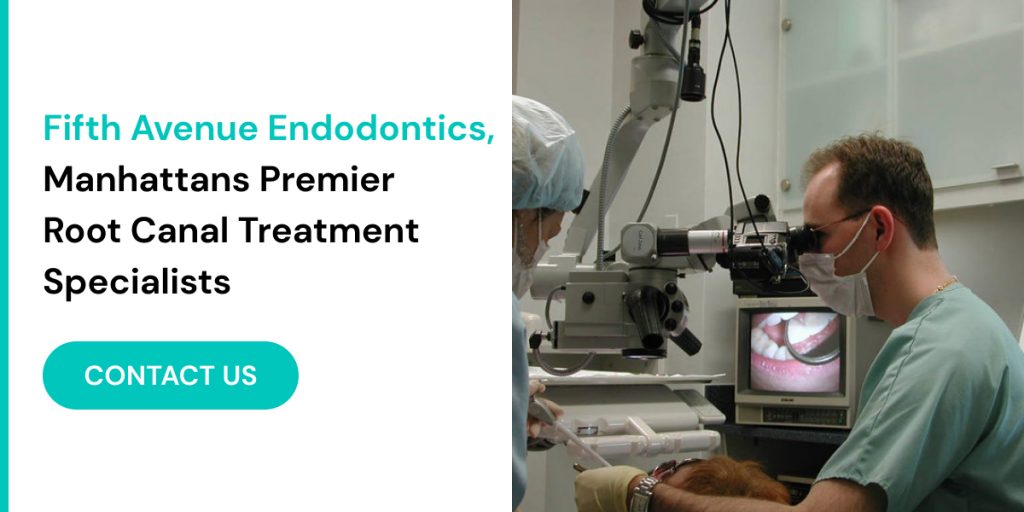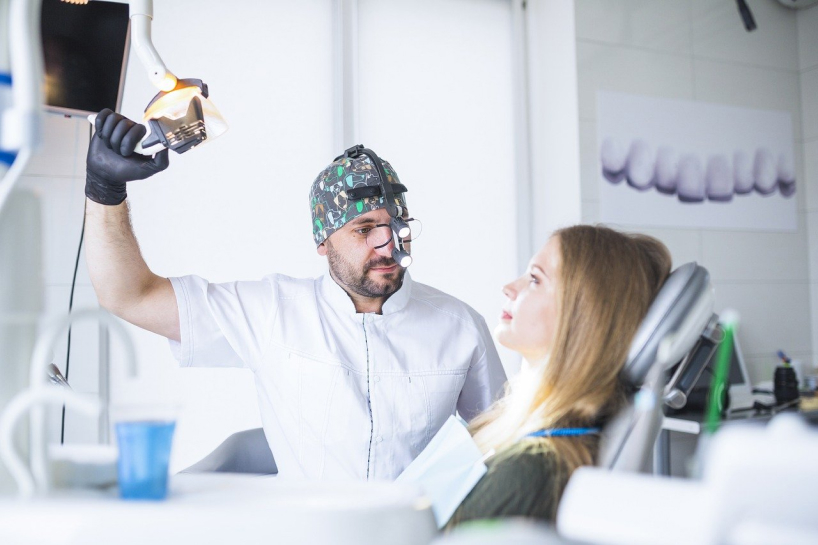Experiencing a broken tooth can be quite distressing, both physically and emotionally. A broken tooth can occur due to various reasons, such as an accident, a fall, or simply biting down on something hard. The suddenness of the event often leaves individuals feeling vulnerable and in pain, emphasizing the need for prompt and effective attention. Ignoring a broken tooth can lead to more severe complications, including infections, further damage, and significant discomfort. At Fifth Avenue Endodontics, under the expert care of Dr. Iofin, we understand the urgency and sensitivity of such dental emergencies. Our practice in New York City specializes in providing comprehensive broken tooth repair treatment, designed to address the immediate pain and restore the tooth’s function and aesthetics. Our team is committed to delivering high-quality care, utilizing advanced techniques and state-of-the-art equipment to ensure the best possible outcomes for our patients. In this guide, we aim to offer a detailed overview of the recovery process following a broken tooth repair, providing valuable insights to help you understand what to expect and how to navigate the healing journey effectively. With the right care and guidance, you can look forward to a swift and smooth recovery, regaining your confidence and comfort.
Understanding Broken Tooth Repair Treatment
Before delving into the recovery timeline, it’s essential to understand what broken tooth repair treatment entails. A broken tooth can vary significantly in severity, from minor chips and cracks to more extensive fractures that impact the tooth’s structure and function. Consequently, the treatment approach must be tailored to the specific nature of the break.
Types of Broken Tooth Repairs:
- Dental Bonding: For minor chips and cracks, dental bonding is a quick and effective solution. This procedure involves applying a tooth-colored resin to the damaged area, which is then shaped and hardened with a special light. Bonding is typically completed in one visit and is ideal for cosmetic repairs and minor structural damage.
- Fillings: When a break involves minor decay or damage that doesn’t extend to the pulp, a filling can restore the tooth’s integrity. Modern fillings are often made from composite resins that match the natural tooth color, providing both strength and aesthetic appeal.
- Crowns: For more significant breaks that compromise a large portion of the tooth, crowns offer a robust and durable solution. A crown is a custom-made cap that covers the entire visible portion of the tooth, protecting it from further damage and restoring its function. The process usually requires two visits: one to prepare the tooth and take impressions, and another to place the permanent crown.
- Root Canal Therapy: If a break extends into the tooth’s pulp, causing pain or risking infection, root canal therapy may be necessary. This procedure involves removing the damaged pulp, cleaning the interior of the tooth, and sealing it to prevent further issues. A crown is typically placed afterward to reinforce the tooth.
- Veneers: For breaks that primarily affect the front teeth, veneers can provide an excellent aesthetic solution. Veneers are thin shells of porcelain or composite resin that are bonded to the front surface of the teeth, covering imperfections and providing a natural appearance.

At Fifth Avenue Endodontics, Dr. Iofin and his team are dedicated to delivering personalized care to ensure the best outcomes for each patient. We conduct a thorough examination and diagnostic process to determine the most appropriate treatment plan. Using advanced dental technology and techniques, we strive to restore both the function and appearance of the damaged tooth effectively.
Personalized Treatment Plans:
Understanding that every patient’s situation is unique, Dr. Iofin emphasizes personalized treatment plans. This approach ensures that each patient receives the most suitable treatment based on their specific dental needs and overall health. At Fifth Avenue Endodontics we take the time to explain all available options, empowering our patients to make informed decisions about their dental care.
With a commitment to excellence and patient-centric care, Fifth Avenue Endodontic aims to provide top-tier broken tooth repair treatment in New York City, ensuring that our patients can smile confidently and comfortably once again.
Immediate Aftercare Post-Treatment
The recovery process begins immediately after your broken tooth repair treatment. Proper aftercare during the initial days is crucial for a smooth and successful healing journey. Here’s what you can expect and how to manage your recovery effectively in the first few days:
- Numbness and Sensitivity: After the procedure, it’s normal to experience some numbness due to the local anesthesia used during the treatment. This numbness should gradually wear off within a few hours. During this period, be cautious not to bite your cheek, tongue, or lip, as the numbness can make it difficult to feel these areas. Additionally, your tooth may be sensitive to hot and cold temperatures for a few days. This sensitivity is a common response as your tooth and the surrounding tissues begin to heal. Using desensitizing toothpaste can help alleviate this discomfort.
- Pain Management: Mild to moderate pain or discomfort is typical after broken tooth repair treatment. Over-the-counter pain relievers such as ibuprofen or acetaminophen are generally effective in managing this pain. Follow the dosage instructions on the packaging, and avoid exceeding the recommended amount. Applying a cold compress to the outside of your cheek near the treated area can also help reduce swelling and numb the pain. If you experience severe pain that is not relieved by these methods, or if the pain worsens over time, contact your endodontist immediately as it could indicate complications that require further attention.
- Dietary Adjustments: For the first 24-48 hours post-treatment, it’s important to be mindful of your diet. Stick to soft foods that do not require much chewing to avoid putting pressure on the treated tooth. Suitable options include yogurt, mashed potatoes, scrambled eggs, smoothies, and soups. Avoid hot, cold, and spicy foods as these can irritate the treated area. Additionally, steer clear of hard, crunchy, or sticky foods that could damage the repair or cause discomfort. Gradually reintroduce harder foods into your diet as your comfort level improves, ensuring you chew on the opposite side of your mouth initially. Pay attention to your body’s signals, and don’t rush the process; your comfort and the integrity of the repair are paramount.
- Oral Hygiene Practices: Maintaining good oral hygiene is essential for promoting healing and preventing infection. However, you need to be gentle around the treated area. Brush your teeth twice a day using a soft-bristled toothbrush, and floss carefully to avoid disturbing the treated tooth. Rinsing with a saltwater solution can help keep the area clean and reduce inflammation. Avoid using mouthwash that contains alcohol, as it can be too harsh and may irritate the treated area.
- Monitoring for Complications: While complications are rare, it’s important to monitor your recovery closely. Keep an eye out for signs of infection, such as increased swelling, pus, a persistent bad taste in your mouth, or fever. If you notice any of these symptoms, contact Fifth Avenue Endodontics promptly for advice and potential treatment. Early intervention can prevent minor issues from becoming more serious problems.
- Rest and Recovery: Rest is an important part of the healing process. Avoid strenuous activities, especially those that could increase your heart rate and cause additional swelling or bleeding. Taking it easy for the first few days can help your body focus on healing the treated area.
By following these aftercare guidelines, you can help ensure a smooth recovery after your broken tooth repair treatment. Dr. Iofin and the team at Fifth Avenue Endodontics are always available to provide support and answer any questions you may have during your recovery process. Remember, proper care and attention to your dental health can significantly enhance the healing experience and ensure long-term success of the treatment.
The First Week of Recovery
During the first week following your broken tooth repair treatment, your mouth will begin to heal, and you should start to notice a significant reduction in discomfort. Adhering to specific recovery guidelines during this period is crucial to ensure a smooth and effective healing process. Here’s a detailed look at what you should focus on during the initial week post-treatment:

- Maintain Oral Hygiene: Maintaining good oral hygiene is vital for a successful recovery. Gently brush your teeth twice a day with a soft-bristled toothbrush, being cautious around the treated area. Use a fluoride toothpaste to strengthen the enamel and promote healing. It’s important to continue flossing daily, but do so with care to avoid disturbing the treated tooth or causing irritation. Opt for unwaxed floss, as it is less likely to catch on any sensitive areas. Avoid using mouthwash that contains alcohol during this period, as alcohol can dry out the mouth and irritate the treated area. Instead, consider rinsing with a mild, alcohol-free mouthwash or a saltwater solution to help reduce inflammation and keep the area clean.
- Monitor for Complications: As you progress through the first week, remain vigilant for any signs of complications. Watch for increased swelling, pus, or persistent pain, as these could indicate an infection or other issues. If you experience any of these symptoms, contact Fifth Avenue Endodontics promptly for further evaluation and guidance. Early detection and treatment of complications can prevent more serious problems and ensure that your recovery stays on track. Additionally, be mindful of any unusual symptoms such as a fever or a persistent bad taste in your mouth, which may also signal an underlying issue requiring attention.
- Avoid Strenuous Activities: Physical exertion can affect your recovery by increasing blood flow to the mouth, which may lead to prolonged bleeding or additional discomfort. For the first few days, it is advisable to avoid strenuous activities such as heavy lifting, intense exercise, or any activities that could inadvertently cause trauma to the treated area. Instead, focus on rest and gentle activities that do not place undue stress on your body. If you engage in sports or other physical activities, consider using a mouthguard to protect your repaired tooth and surrounding structures from potential impacts.
- Dietary Considerations: In addition to oral hygiene and activity restrictions, dietary choices play a crucial role in your recovery. Continue to stick to soft foods and avoid anything that could be hard, crunchy, or sticky. These types of foods can potentially damage the treated area or cause discomfort. Gradually reintroduce more solid foods as you feel more comfortable, but remain cautious until you are fully healed. Hydrate well and avoid excessive consumption of acidic or sugary foods that might irritate the treated tooth or affect the overall healing process.
- Rest and Recovery: Adequate rest is essential for optimal healing. Ensure you get plenty of sleep and avoid overexerting yourself. Your body needs energy to repair and heal, so take time to relax and recuperate. Listen to your body and give yourself permission to take it easy as you recover.
By adhering to these guidelines during the first week of recovery, you can help ensure a smooth and effective healing process following your broken tooth repair treatment. The team at Fifth Avenue Endodontics, led by Dr. Iofin, is here to support you through every step of your recovery journey. If you have any questions or concerns, don’t hesitate to reach out for guidance and support.
Long-Term Recovery and Final Results
The complete healing process for broken tooth repair treatment can take several weeks to months, depending on the complexity of the procedure and individual healing rates. Here’s what to expect in the long term:
- Follow-Up Appointments: Regular check-ups with Dr. Iofin are crucial to monitor the healing process and ensure the success of the treatment. These appointments allow your endodontist to address any issues promptly.
- Permanent Restorations: If your treatment involved a temporary solution, you would need to return for a permanent restoration, such as a crown, once the tooth and surrounding tissues have healed.
- Lifestyle Adjustments: To protect your repaired tooth and overall oral health, avoid habits that could cause further damage, such as chewing on ice, using your teeth as tools, or grinding your teeth. Consider wearing a mouthguard if you play sports or grind your teeth at night.
Frequently Asked Questions About Broken Tooth Repair Treatment Recovery
How Long Will I Feel Discomfort After Treatment?
Discomfort typically subsides within a few days to a week. However, the exact duration varies from person to person. Over-the-counter pain relievers can help manage any discomfort during this period.
When Can I Resume Normal Eating Habits?
You can gradually return to your normal diet as your comfort level improves, usually within a week. However, it’s essential to avoid hard or sticky foods that could damage the treated tooth.
Is It Normal to Experience Sensitivity?
Yes, sensitivity to hot and cold temperatures is common after broken tooth repair treatment. This sensitivity should decrease over time. If it persists, consult Dr. Iofin at Fifth Avenue Endodontics.
What Should I Do If I Experience Severe Pain or Swelling?
Severe pain or swelling could indicate an infection or other complications. Contact your endodontist immediately if you experience these symptoms.

Conclusion: Ensuring a Smooth Recovery
Recovering from broken tooth repair treatment in New York City involves several stages, from immediate aftercare to long-term healing. By following the guidelines provided by your endodontist and attending regular follow-up appointments, you can ensure a successful recovery and maintain your oral health. At Fifth Avenue Endodontic, Dr. Iofin and his team are committed to providing comprehensive care and support throughout your recovery journey. Whether you need guidance on aftercare or have concerns about your treatment, don’t hesitate to reach out to us.
In conclusion, while the timeline for recovery from broken tooth repair treatment can vary, understanding the process and following professional advice can significantly enhance your healing experience. Remember, your journey to a restored smile begins with expert care and continues with diligent aftercare and lifestyle adjustments.

